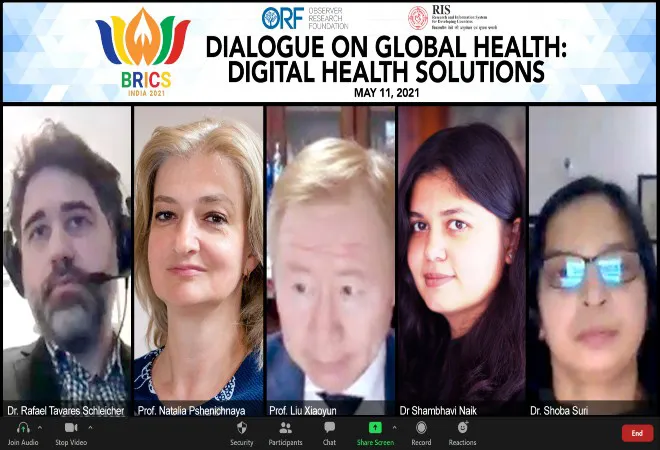Participants:
- Dr Rafael Tavares Schleicher, Public Health Analyst / Researcher, Institute for Applied Economic Research (IPEA), Brazil
- Prof Natalia Pshenichnaya, Doctor of Medical Sciences, Professor of infectious diseases, Deputy Director for Clinical and Analytical Work, FBSI, Russia
- Prof Liu Xiaoyun, Deputy Director of China Centre for Health Development Studies, Peking University, China
- Dr Shambhavi Naik, Head of Research, Takshashila Institution, India
Moderator:
Dr. Shoba Suri, Senior Fellow, Health Initiative, ORF
Issues related to global health and delivery of health-related services have taken centre stage since the start of the COVID-19 pandemic. There has been a galvanisation of innovation and real time collaboration across countries to find solutions for the pandemic. Needless to say that this was enabled by digital technologies with telemedicine and virtual cooperation getting a boost. The pandemic proved that public health requires cooperation on global solutions. A multilateral effort is central to this.
In this context, Dr Rafael Schleicher, a researcher from the Institute of Applied Economic Research in Brazil argued that it is important that data gathering systems be harmonised to ensure better collaboration amongst countries. The aim, he continued, was to move from mere data gathering to proper data usage. Taking the example of Brazil, he noted that the country has come up with an e-Health strategy as well as investing in broader areas of telehealth and telemedicine.
The emphasis on proper data collection is understandable given the need for robust information to create effective policies to contain global health issues like the pandemic. This has become both more complex, and easier with digital technologies. For instance, Prof Pschenichnaya, Deputy Director for Clinical and Analytical Work, FBSI, Russia, noted that Russia has two functioning databases to deal with COVID, one of the Russian Centre for Disease Control, and the other for contact tracing. This data can also be used for genome mapping and plotting the distribution of cases. However, the lack of harmonisation in data collection methods makes this task difficult at a more international level.
In addition to the above, it is important to acknowledge that telemedicine cannot be a substitute for face-to-face consultations. Dr Naik, Head of Research, Takshashila Institution, India, observed the importance of investing in general health infrastructure as well as the need to address the digital divide. This can be done through standardising how health information is collected, transparent data reporting, increased data protection and privacy, and strengthening the role of health regulators. BRICS nations, she noted, can overcome barriers to digital health and mutually benefit by promoting innovation, shared funding, supporting start-ups, and creating sandboxes.
COVID-19 has highlighted the crucial role of multilateral cooperation in enabling knowledge sharing and transferring international learnings to the national context. Data interoperability must be promoted to help design early warning systems for future health emergencies.
Prof Liu, Deputy Director of China Centre for Health Development Studies, Peking University, China, emphasised that the digital divide was not just limited to access of it amongst the rich and the poor and t, but also about the generational divide between the old and the young. It is important, he noted, to spread digital literacy amongst the elderly so that they can take advantage of these digital health solutions. Prof Liu’s assertions are also important when we see them in the context of how the aged are more vulnerable in times of pandemic, but also are likely to have more day-to-day health concerns.
Dr. Shobha Suri, Senior Fellow at Observer Research Foundation noted the importance of data and information management systems in the times of a pandemic. She also reiterated the need for a robust strategy to implement digital health solutions. This is also important from the viewpoint of meeting our Sustainable Development Goals.
This report was written by Jhanvi Tripathi, Associate Fellow, ORF
The views expressed above belong to the author(s). ORF research and analyses now available on Telegram! Click here to access our curated content — blogs, longforms and interviews.




 PREV
PREV

